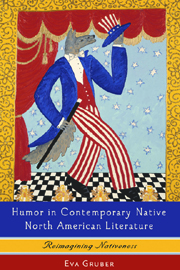Book contents
- Frontmatter
- Contents
- Preface and Acknowledgments
- Introduction
- 1 Humor in Native North American Literature and Culture: Survey
- 2 Reimagining Nativeness through Humor: Concepts and Terms
- 3 Expressing Humor in Contemporary Native Writing: Forms
- 4 Humor at Work in Contemporary Native Writing: Issues and Effects
- Conclusion
- Appendix: The State of Research on Humor in Native Writing
- Works Cited
- Index
3 - Expressing Humor in Contemporary Native Writing: Forms
Published online by Cambridge University Press: 12 September 2012
- Frontmatter
- Contents
- Preface and Acknowledgments
- Introduction
- 1 Humor in Native North American Literature and Culture: Survey
- 2 Reimagining Nativeness through Humor: Concepts and Terms
- 3 Expressing Humor in Contemporary Native Writing: Forms
- 4 Humor at Work in Contemporary Native Writing: Issues and Effects
- Conclusion
- Appendix: The State of Research on Humor in Native Writing
- Works Cited
- Index
Summary
AFTER THESE THEORETICAL CONSIDERATIONS, it is high time we look at some texts. While a formal analysis of humor in contemporary Native literature cannot (and should not) be conducted in disregard of thematic issues, in the following I focus predominantly on the means and strategies that authors employ to achieve comic effects — the question of how humor is conveyed. The topics, functions, and effects of such humor, that is, the question of what such humor deals with and why it is used in a specific context, is explored in chapter four. As pointed out above, most of the writers discussed here draw on both Western and Native traditions and work with, rather than outside of, previous discourses. Consequently, the forms of humor they use originate from both Western literary and Native oral traditions and are explored according to criteria deriving from either set of cultural paradigms. Each form or variety is briefly introduced before its use in contemporary Native texts is illustrated by brief examples or close readings. The “categories” into which the wide range of literary, linguistic, and cultural means of humorous expression have been divided are not to be understood as mutually exclusive, however. Quite in contrast, it is often impossible to assign a particular textual example to just one category. Parody, for instance, builds on intertextuality, just as wordplay may be used to allude to something, or dramatic irony may be anchored in oral storytelling techniques; yet for the sake of clarity, these are discussed under separate headings.
- Type
- Chapter
- Information
- Humor in Contemporary Native North American LiteratureReimagining Nativeness, pp. 55 - 115Publisher: Boydell & BrewerPrint publication year: 2008

